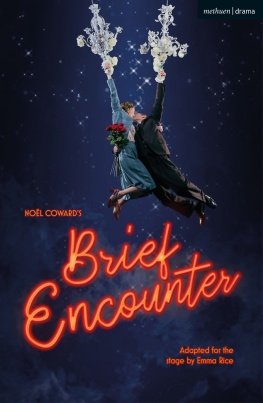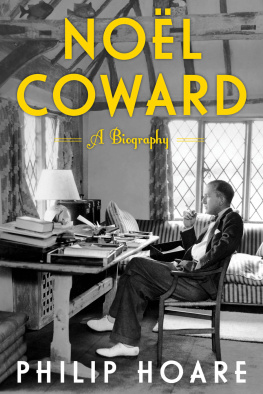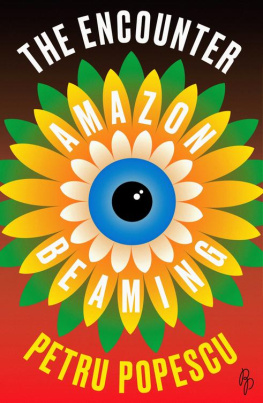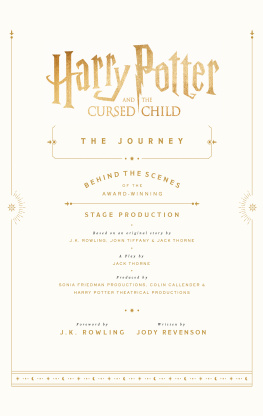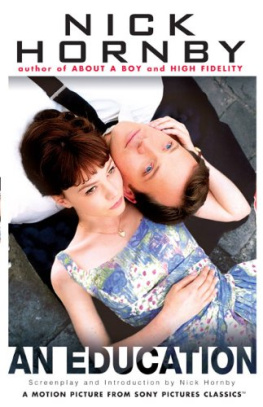METHUEN DRAMA Bloomsbury Publishing Plc 50 Bedford Square, London, WC1B 3DP, UK BLOOMSBURY, METHUEN DRAMA and the Methuen Drama logo are trademarks of Bloomsbury Publishing Plc This adaptation of
Brief Encounter first published 2013 This edition with a revised foreword and a new cover published 2018 Copyright NC Aventales AG, 2013 Foreword copyright Emma Rice, 2013, 2018 Cover artwork by Bob King Creative Photography by Hugo Glendinning All rights reserved. No part of this publication may be reproduced or transmitted in any form or by any means, electronic or mechanical, including photocopying, recording, or any information storage or retrieval system, without prior permission in writing from the publishers. Bloomsbury Publishing Plc does not have any control over, or responsibility for, any third-party websites referred to or in this book. All internet addresses given in this book were correct at the time of going to press. The author and publisher regret any inconvenience caused if addresses have changed or sites have ceased to exist, but can accept no responsibility for any such changes. No rights in incidental music or songs contained in the work are hereby granted and performance rights for any performance/presentation whatsoever must be obtained from the respective copyright owners.
All rights whatsoever in this play are strictly reserved and application for performance etc. should be made before rehearsals by professionals to Alan Brodie Representation Ltd, No performance may be given unless a licence has been obtained. A catalogue record for this book is available from the British Library. A catalog record for this book is available from the Library of Congress. ISBN: PB: 978-1-3500-8357-8 ePDF: 978-1-3500-8358-5 eBook: 978-1-3500-8360-8 Series: Modern Plays Typeset by Mark Heslington Ltd, Scarborough, North Yorkshire Printed and bound in Great Britain To find out more about our authors and books visit www.bloomsbury.com and sign up for our newsletters. ForewordJanuary 2018 It is 10 years since I first adapted and created this version of Nol Cowards Brief Encounter. I gasp for air as I look back and realise how much has changed in this time.
Politics have polarized, society has shifted and my own understanding of the world has both grown and been challenged. Some things, however, remain deeply rooted and reassuring; the profound power of Brief Encounter is one of them. It is with great pride and joy that I return to this life-changing project and, in spite of all the changes in the world, my words from 2008 still ring as true as ever. And so, I will leave you with Nol Coward and my younger self in the knowledge that this great piece continues to endure with passion, truth and hope. Heres to that! ER January 2008 I love romance. Brief Encounter has surprisingly embraced both these passions. Brief Encounter has surprisingly embraced both these passions.
In Still Life, later to become Brief Encounter, Nol Coward wrote a play about an affair. Not a sordid affair but a love affair between two married people. An impossible affair, a painful affair, an unacceptable affair. It is written with such empathy, such observation and such tender agony. This man knew what he was writing about. Imagine being gay in the 1930s and you begin to understand Brief Encounter.
Imagine the impossibility of expressing the most fundamental of human needs and emotions. Imagine the enforced shame, lies and deceit. Imagine the frustration, imagine the loss and imagine the anger. Each of these emotions is delicately and Britishly traced through the meetings of our lovers. They experience a micro marriage, a relationship from beginning to end in a few short hours and how many of us cannot relate to this careful and painful liaison? Not many, Im sure. Can many of us go through a lifetime without meeting someone and feeling a spark of recognition that we shouldnt, an attraction that goes beyond the physical? And what a terrible world it would be if our emotions and spirits and psyches were amputated at the altar.
And here is where real life ends and folk tales begin. In the language of stories, we are able to examine the bargains that human beings make. We see how we make bargains with the deep needs of the self for various reasons. These reasons will be familiar to us all: the fear of being alone or of being excluded from normal life. In the language of folk stories the price of this bargain is often physical. A part of the body is chopped off a hand (The Handless Maiden) or feet (The Red Shoes).
We literally cut a part of ourselves off in order to conform or to be accepted. In Brief Encounter, both our lovers have chopped off part of themselves. It is delicately referred to, but Laura talks of swimming wild and free and of playing the piano. Both of these are forms of personal expression not pleasing anyone but exploring the deep waters of the soul. Alec turns into a child when he talks of his passions, and fears that Laura will be bored. These are people trapped by the bargains that they have freely made they have bargained their inner lives for stability, family and love.
Oh yes, love. I dont for a moment believe that their marriages are all bad or that they are in any way victims. Presumably, their respective partners are as equally trapped by their own bargains and by the rules of society itself. None of us are victims, but we can review the bargains we make and sometimes, sometime, we can escape in a profound way. I have been reading many Selkie stories whilst making this piece. In these stories, a sherman falls in love with a Selkie or Seal Woman whom he sees dancing on the rocks having slipped out of her sealskin.
She too, falls for him. He takes her home and hides her skin. He cares for her and she for him; they have children and live a life of contentment. One day, she nds her old skin in a cupboard. She washes and dresses the children, kisses them goodbye, puts on her sealskin and dives back into the sea. She never returns but sometimes the children will see a beautiful seal swimming far out at sea.
This teaches us about our true self. No matter how much we try to repress our feelings or how much we wish to conform, our true self will always emerge. There can be no happily ever after until this true self, or nature, has been accepted and embraced. In the language of folk tales, in order to nd ones true self, it is often vital that there is a near-death experience before our heroes and heroines can begin to heal and to reform. In Sleeping Beauty and Snow White our heroines are unconscious, almost dead, for long periods of time. In Brief Encounter our lovers also die spiritually when they part.
I never want to feel anything again, says Laura. This deep depression is an essential part of the process of change. It is something to be endured, understood and then moved away from. The end of the affair is not the end of hope or of love. It is part of the process of change. Alec will travel and see the world in a wider context.
Laura will have to re-imagine herself, not just as a respectable wife and mother but as a person in her own right. My hope is that, like the Seal Woman, Alec and Laura escape. Not with each other in an idealistic romantic way but an escape provoked by the personal awakening they felt when they met. We humans are fearful by nature it is often somebody else who provides the catalyst for change but they are not the cause. Change can only happen from within. After our story ends, I like to think that our lovers will change.

